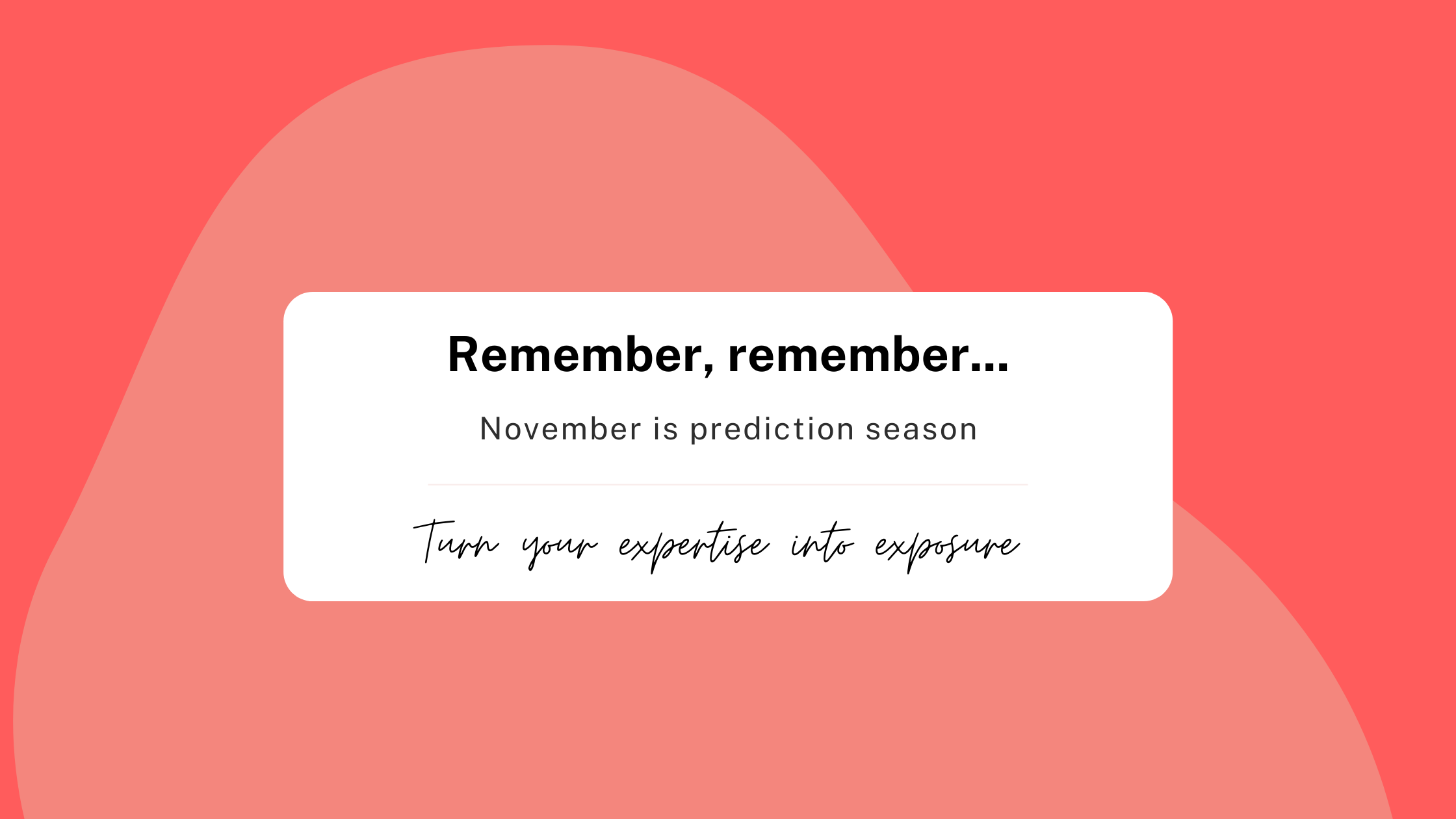November is prediction season. Every year. It’s when businesses and brands make their predictions for what’s going to happen in their industry next year, and pitch these as stories to the media with the aim of securing press coverage.
These are data-led stories that rely on spikes, dips and quirks in your data from this year versus last year (or even further back) to predict what’ll happen next year. It’s a great way to position you or your business as an expert in your field while securing the endorsement of a third party (the media) to add weight to your brand’s credibility.
How to predict on the back of a pandemic
This year doesn’t need to be any different despite the fluctuations the pandemic likely had on most businesses (good and bad). But you may have to cut your data differently to find the nuggets you need to make a story.
If you’re in a forward selling business like travel, how do bookings since September for 2021 compare to the same period last year for 2020 holidays? Look for shifts like...
Booking lead time
Holiday length
Destination popularity
Group size
Supply vs demand
If you’re in retail or ecommerce, what are your predictions around consumer buying behaviour? Identify trends such as…
Shifts in product popularity
Browse-to-buy lead time
Channels driving conversion
If you’re in finance, use what you know of the industry and how it has responded to the economic plight posed by the pandemic to hypothesise on how the economy will recover in 2021. For example,
How to close the rich-poor divide
The speed of economic recovery across the regions
Industries that will continue to grow/fade
The prospects for interest rates
Piggyback the news agenda with your own commentary when leaks about the Chancellor’s plan hit the press
If you’re in property, what has the pandemic’s impact on the industry taught you about appetite for investment and consumer lifestyle changes? Can you predict, based on your data, for example...
whether marketing to completion lead times will shorten or grow?
whether the market is being driven by investors or home movers?
how supply & demand will continue to impact house prices in your area (positively or negatively)
future prospects for first time buyers
Got something to say?
Draft a compelling statement, bullet point the stats that qualify your position and include a quote from the most relevant person in your business.
Some media relations do’s and don’ts
You don’t need to write a press release to get a journalist to listen to what you’ve got to say.
You do need to have decent stats - a percentage that implies something remarkable or shape shifting for your industry
You don’t want to reveal your raw data - talk in proportions and percentages so as not to give away your business’s performance
You do need a quote that reinforces your stats (without repeating them) and what it could mean for your industry, for consumers, for business, etc.
You don’t need a professional PR person to do this for you if you’ve got existing relations with the media who’d be interested in your perspective
You do need to target your statement at relevant publications, online titles and journalists, and include why you think what you have to say may be of interest to their readership (prove that you’ve done your research on them and that you know their audience is also your audience)
Ready to talk to the press?
What happens if the journalist responds and wants to talk to you or your company spokesperson?
Be available
Be concise
Know when to bridge an awkward question to instead express a message you want to get across to the audience (think like a politician!)
Don’t be drawn on a topic you’re not briefed to respond on
Don’t be afraid to say you’re not in a position to comment on what’s being asked
Get some media training - I can point you in the right direction
Amplify the coverage you achieve, smartly
If you secure some press coverage from your efforts, you’ll have raised the profile of your brand with your target readership and may already have started to see some response. But it doesn’t stop there.
Without risking breach of the publisher’s copyright, talk about your inclusion in the specific media and what you had to say - just don’t quote the article or photograph it (you need a pricey licence for that). If it’s online, you can link to it and you’d be wise to share it with your own audiences as timely and relevant (think social media, email marketing, website about us page).
And always remember to thank the journalist. They’ll appreciate your timely and relevant contribution. You’ll appreciate the platform they’ve given you more, so express that gratitude and keep in touch with them. You never know when either of you might need the other in the future.
Need a PR consultant or coach?
I work with founder-run businesses ready to take control of their reputation, shape how their organisation communicates and increase their share of voice in their industry. Drop me a line for an exploratory conversation.

